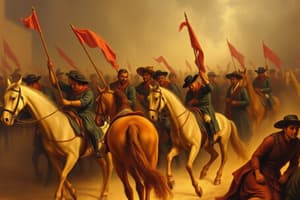Podcast
Questions and Answers
What was a significant impact of Thomas Paine's pamphlet 'Common Sense'?
What was a significant impact of Thomas Paine's pamphlet 'Common Sense'?
- It called for loyalty to the British Crown.
- It criticized the Articles of Confederation.
- It suggested continued negotiation with British authorities.
- It argued for immediate independence from Britain. (correct)
Which document formally declared the American colonies' independence from Britain?
Which document formally declared the American colonies' independence from Britain?
- The Constitution
- The Declaration of Independence (correct)
- The Bill of Rights
- The Articles of Confederation
What principle does 'popular sovereignty' emphasize in the context of the American Revolution?
What principle does 'popular sovereignty' emphasize in the context of the American Revolution?
- Monarchy is the preferred form of government.
- Government should be established by military force.
- The authority of government comes from the consent of the governed. (correct)
- Rights are granted by the ruling authority.
Which act was NOT mentioned as a reason for colonial anger against British rule?
Which act was NOT mentioned as a reason for colonial anger against British rule?
Who primarily drafted the Declaration of Independence?
Who primarily drafted the Declaration of Independence?
What was the primary aim of the Proclamation of 1763?
What was the primary aim of the Proclamation of 1763?
How did colonists generally respond to the Sugar Act of 1764?
How did colonists generally respond to the Sugar Act of 1764?
What marked the end of salutary neglect in British colonial policy?
What marked the end of salutary neglect in British colonial policy?
What was a significant characteristic of vice-admiralty courts?
What was a significant characteristic of vice-admiralty courts?
Why did the Stamp Act of 1765 provoke widespread protests among colonists?
Why did the Stamp Act of 1765 provoke widespread protests among colonists?
What concept did the British government use to justify taxation without representation?
What concept did the British government use to justify taxation without representation?
What was a direct consequence of the ending of salutary neglect in the colonies?
What was a direct consequence of the ending of salutary neglect in the colonies?
What legal requirement did the Stamp Act impose on colonists?
What legal requirement did the Stamp Act impose on colonists?
What was the primary purpose of the Stamp Act Congress?
What was the primary purpose of the Stamp Act Congress?
How did the Sons of Liberty influence colonial resistance?
How did the Sons of Liberty influence colonial resistance?
What was the objective of the non-importation movement?
What was the objective of the non-importation movement?
What role did the Committees of Correspondence play before the Revolutionary War?
What role did the Committees of Correspondence play before the Revolutionary War?
What significant actions did the Second Continental Congress take?
What significant actions did the Second Continental Congress take?
What was King George III's perceived role during the American Revolution?
What was King George III's perceived role during the American Revolution?
Which group was formed primarily to oppose the Stamp Act?
Which group was formed primarily to oppose the Stamp Act?
Which of the following was a consequence of the non-importation movement?
Which of the following was a consequence of the non-importation movement?
Study Notes
Proclamation of 1763
- Issued by King George III after the British victory in the French and Indian War.
- Forbade colonial settlement west of the Appalachian Mountains to stabilize relations with Native Americans.
- Angered colonists seeking westward expansion, increasing tensions with Britain.
Sugar Act of 1764
- Officially called the "American Revenue Act," lowered the molasses tax but increased enforcement of customs duties.
- Aimed to generate revenue for Britain, heavily burdened by war debt.
- Viewed by colonists as a violation of their rights due to lack of representation in Parliament.
End of Salutary Neglect
- Prior to the French and Indian War, Britain practiced lax enforcement of colonial laws allowing self-governance.
- Britain's need to address war debts led to the strict enforcement of regulations and taxes.
- Marked a turning point in colonial-British relations, fostering resentment among colonists.
Vice-Admiralty Courts
- Established by Britain to handle maritime and trade cases without juries.
- Judges were appointed by the Crown, leading colonists to perceive these courts as denying fair trial rights.
- Became a symbol of British oppression for colonists.
Stamp Act of 1765
- First direct tax on colonies, requiring purchase of stamped paper for legal documents, newspapers, and publications.
- Revenue intended to support British troops in the colonies, sparking opposition framed as "taxation without representation."
- Triggered widespread protests and was eventually repealed in 1766.
Virtual Representation
- British argument that colonists were "virtually represented" in Parliament, despite lack of direct representation.
- Colonists rejected this claim, insisting on taxation only by their elected representatives.
Stamp Act Congress
- Convened in New York in 1765 with delegates from nine colonies to coordinate resistance against the Stamp Act.
- Drafted a petition asserting only colonial assemblies could tax colonies, promoting early colonial unity.
Sons of Liberty
- Secret organization formed to resist the Stamp Act and other British policies, led by figures such as Samuel Adams.
- Organized protests, boycotts, and demonstrations against British officials, playing a key role in the Stamp Act's repeal.
Non-importation Movement
- Widespread boycott of British goods initiated by colonists in response to taxation policies.
- Aimed to economically pressure Britain to repeal taxes, fostering a collective colonial identity.
Committees of Correspondence
- Local groups established to communicate and coordinate colonial resistance to British policies.
- Facilitated rapid information exchange and promoted unity leading up to the Revolutionary War.
Second Continental Congress
- Convened in May 1775 after battles of Lexington and Concord, serving as de facto government during the Revolutionary War.
- Organized the Continental Army, appointed George Washington as commander, and declared independence from Britain in 1776.
King George III
- Monarch of Great Britain during the American Revolution, symbolizing British oppression in the colonies.
- His support for oppressive measures fueled colonial anger and resistance, contributing to the push for independence.
Thomas Paine’s Common Sense
- Published in January 1776, advocating for immediate independence from Britain.
- Criticized monarchy and called for a republican government, significantly influencing public opinion in favor of independence.
Declaration of Independence
- Adopted on July 4, 1776, outlining the colonies’ grievances against King George III.
- Drafted mainly by Thomas Jefferson, it articulated principles of natural rights and government by consent, foundational for the new nation.
Popular Sovereignty
- Concept that government authority derives from the consent of the governed, typically through elected representatives.
- Central to the argument for self-governance and opposition to British rule during the American Revolution, later integral to American democracy.
Studying That Suits You
Use AI to generate personalized quizzes and flashcards to suit your learning preferences.
Description
This quiz assesses your understanding of key events and policies that heightened tensions between the American colonies and Britain from 1763 to 1764. Topics include the Proclamation of 1763, the Sugar Act of 1764, and the end of salutary neglect. Test your knowledge on how these developments shaped colonial attitudes towards British rule.




